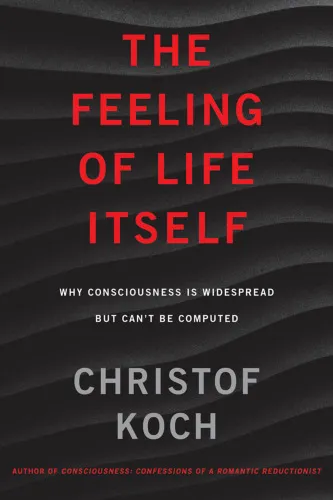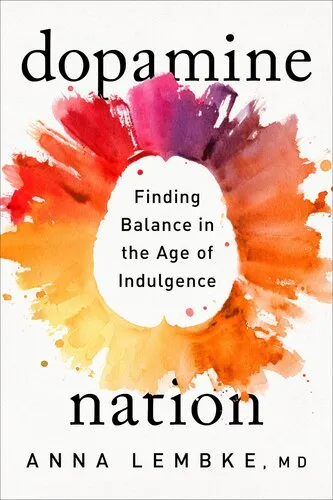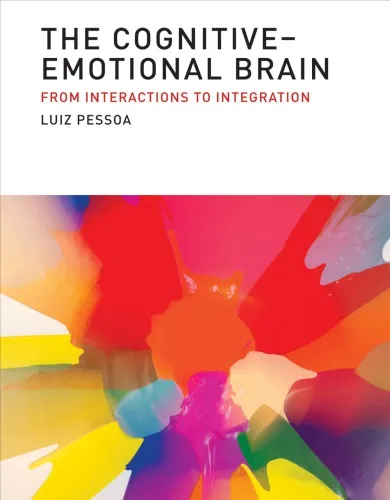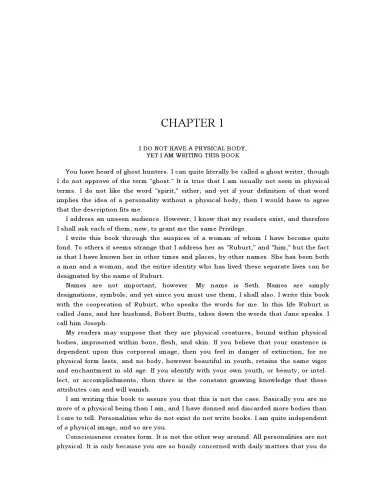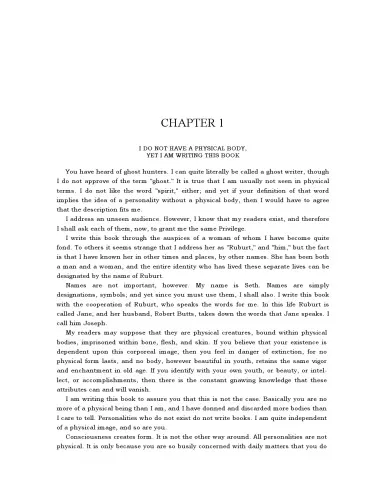The Feeling of Life Itself: Why Consciousness Is Widespread but Can't Be Computed
4.3
بر اساس نظر کاربران

شما میتونید سوالاتتون در باره کتاب رو از هوش مصنوعیش بعد از ورود بپرسید
هر دانلود یا پرسش از هوش مصنوعی 2 امتیاز لازم دارد، برای بدست آوردن امتیاز رایگان، به صفحه ی راهنمای امتیازات سر بزنید و یک سری کار ارزشمند انجام بدینکتاب های مرتبط:
خلاصه تحلیلی کتاب
کتاب «The Feeling of Life Itself: Why Consciousness Is Widespread but Can't Be Computed» اثری پژوهشی و عمیق در حوزه علوم اعصاب و فلسفه ذهن است که بر پایه سالها تحقیق و تأمل شکل گرفته است. نویسنده در این اثر میکوشد به پرسشی بنیادین پاسخ دهد: آگاهی چیست و چرا نمیتوان آن را بهطور کامل در قالب محاسبات شبیهسازی کرد؟
اثر حاضر با تمرکز بر مفهوم subjective experience یا همان تجربهگرایی، سعی دارد تعریف جامعی از آگاهی ارائه کند که هم از نظر زیستشناسی و هم از منظر فلسفه، قابل اتکا باشد. نویسنده ضمن نقد دیدگاههایی که آگاهی را صرفاً پدیدهای emergent در سیستمهای پیچیده میدانند، نشان میدهد که ویژگیهای ذاتی تجربه آگاهانه نه از جنس محاسبات، بلکه از جنس کیفیتهای پدیداری (qualia) هستند.
با طرح ایده Integrated Information Theory (IIT)، کتاب مرزهای تفکر سنتی درباره رابطه بین ماده و ذهن را کنار زده و چارچوبی معرفی میکند که در آن آگاهی بهعنوان ویژگی بنیادی طبیعت در نظر گرفته میشود؛ مشابه جرم یا انرژی.
نکات کلیدی و کاربردی
یکی از مهمترین نکات کتاب، تأکید بر این نکته است که سیستمهای مصنوعی و محاسباتی، حتی با پیچیدگی بالا، لزوماً واجد آگاهی نیستند. این موضع، دیدگاه حاکم در برخی شاخههای هوش مصنوعی را به چالش میکشد.
از دیگر نکات مهم، نگاه بینرشتهای کتاب است؛ جایی که دادههای تجربی علوم اعصاب با تحلیلهای فلسفی در هم میآمیزند. این ویژگی باعث میشود کتاب منبعی ارزشمند برای پژوهشگرانی باشد که به دنبال فهم عمیقتر جایگاه آگاهی در جهان هستند.
همچنین، نویسنده با بررسی مثالهای طبیعی و غیرانسانی از آگاهی، دامنه بحث را از انسان فراتر برده و مطرح میکند که آگاهی میتواند بسیار گستردهتر از آنچه تاکنون تصور شده باشد، حضور داشته باشد.
نقلقولهای ماندگار
کتاب پر است از جملات تاملبرانگیزی که میتوانند الهامبخش پژوهشگران و علاقمندان باشند.
آگاهی خودِ تجربه است، نه ابزاری برای کسب آن. نامشخص
برای درک آگاهی باید کیفیت پدیداری را جدی بگیریم، نه فقط رفتار را. نامشخص
چرا این کتاب اهمیت دارد
این کتاب در میان آثار حوزه آگاهی جایگاه خاصی دارد، زیرا با پشتوانه نظریهی IIT، بحثی بنیادین را درباره مرز بین محاسبه و تجربه مطرح میکند. این مرز برای تعریف حدود تواناییهای هوش مصنوعی و فهم ماهیت ذهن، اهمیتی حیاتی دارد.
اهمیت کتاب نه تنها در محتوای علمی آن بلکه در روش تلفیق فلسفه و علم است. اندیشمندان علوم شناختی، فیلسوفان ذهن و حتی مهندسان هوش مصنوعی میتوانند از این اثر برای توسعه چارچوبهای بهتر در تحلیل آگاهی بهره بگیرند.
نتیجهگیری الهامبخش
کتاب «The Feeling of Life Itself: Why Consciousness Is Widespread but Can't Be Computed» ما را به تعمق در مرزهای فهم بشری فرا میخواند. این اثر یادآوری میکند که آگاهی، فراتر از الگوریتمها و مدلهای محاسباتی، بخش جداییناپذیر تجربه زنده است. فارغ از پیشینه علمی یا فلسفی، هر کسی که دغدغه فهم چیستی زندگی و تجربه را دارد، از مطالعه این کتاب غنی خواهد شد. اگر به این پرسش بنیادین علاقهمندید، پیشنهاد میکنم آن را مطالعه کرده و دیدگاه خود را با دیگران به اشتراک بگذارید.
Analytical Summary
In The Feeling of Life Itself: Why Consciousness Is Widespread but Can't Be Computed, Christof Koch distills decades of inquiry into one of humanity’s most profound questions: what is consciousness, and why does it exist? Moving beyond reductionist models, the book presents a richly argued case that consciousness is a fundamental property of the universe, not an emergent byproduct that can be fully replicated by computers.
Koch draws heavily on Integrated Information Theory (IIT), a scientific framework suggesting that subjective experience arises from systems with specific causal properties. This theory is juxtaposed with other prevailing ideas in neuroscience and philosophy of mind, inviting readers to critically assess competing explanations. Throughout, Koch offers lucid illustrations and accessible analogies without sacrificing intellectual rigor.
The narrative is anchored in both empirical neuroscience and philosophical reflection, making it equally relevant to laboratory scientists and academic philosophers. Rather than focusing on sensationalist claims, the book emphasizes the nuanced complexity of subjective experience. Koch insists that consciousness cannot be reduced to mere computation, challenging the assumptions that underlie artificial intelligence research.
Key Takeaways
This book provides readers with a unified perspective that combines neuroscience, philosophy, and a deep respect for subjective experience. By the end, readers will have a refined understanding of why consciousness is both widespread among living systems and resistant to mechanical simulation.
Key lessons include the definition and scope of Integrated Information Theory, the limitations of algorithmic models, and the moral implications of recognizing consciousness in non-human organisms.
Memorable Quotes
Consciousness is the only bit of reality we can experience directly, everything else is an inference.Christof Koch
Machines may compute, but they do not feel.Unknown
We must acknowledge the possibility that consciousness pervades the living world.Christof Koch
Why This Book Matters
The Feeling of Life Itself: Why Consciousness Is Widespread but Can't Be Computed is more than an academic treatise—it is a call to reevaluate the foundations of neuroscience, cognitive science, and AI research.
By refusing to conflate consciousness with computation, Koch encourages scientists and thinkers to probe the intrinsic qualities of subjective awareness, thereby shaping ethical and technological discourse. Secondary topics such as Integrated Information Theory and philosophy of mind are skillfully integrated to show their relevance to everyday debates, from medical ethics to machine rights.
Inspiring Conclusion
For serious readers, academics, and professionals, The Feeling of Life Itself: Why Consciousness Is Widespread but Can't Be Computed offers both intellectual challenge and profound insight. It is an invitation to consider consciousness not as a puzzle to be reverse-engineered, but as a cornerstone of reality itself.
Koch’s work urges us to read attentively, share our reflections, and engage in rigorous discourse about the nature of mind. The next step is clear: delve into the text, ponder its arguments, and bring your own expertise to the conversation about what it truly means to feel life itself.
دانلود رایگان مستقیم
شما میتونید سوالاتتون در باره کتاب رو از هوش مصنوعیش بعد از ورود بپرسید
دسترسی به کتابها از طریق پلتفرمهای قانونی و کتابخانههای عمومی نه تنها از حقوق نویسندگان و ناشران حمایت میکند، بلکه به پایداری فرهنگ کتابخوانی نیز کمک میرساند. پیش از دانلود، لحظهای به بررسی این گزینهها فکر کنید.
این کتاب رو در پلتفرم های دیگه ببینید
WorldCat به شما کمک میکنه تا کتاب ها رو در کتابخانه های سراسر دنیا پیدا کنید
امتیازها، نظرات تخصصی و صحبت ها درباره کتاب را در Goodreads ببینید
کتابهای کمیاب یا دست دوم را در AbeBooks پیدا کنید و بخرید
1162
بازدید4.3
امتیاز0
نظر98%
رضایتنظرات:
4.3
بر اساس 0 نظر کاربران
Questions & Answers
Ask questions about this book or help others by answering
No questions yet. Be the first to ask!
